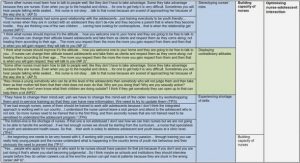Get Complete Project Material File(s) Now! »
LITERATURE REVIEW
African nations are comprised of multilingual and monolingual societies whose languages have been viewed as inferior and the citizenry has been exposed to dehumanizing experiences especially in schools during the colonial era once they were found conversing in their mother language in the school premises. They have been subjected to some corporal punishment, despised and looked down upon and considered outcasts in the school premises. This treatment obviously has had a negative impact on the peoples of Africa. This kind of treatment has been carried over into the post-colonial era where African languages still play second fiddle to foreign languages if one looks at the position or status of African languages in education from primary level to university, parliament, media and written literature as well.
Corpus Planning
Corpus planning refers to activities such as coining of new terms, reforming spelling and adopting a new script. It refers, in short, to the creation of new forms, the modification of old ones, or the selection from alternative forms in a spoken or written code. According to Mutasa, “corpus planning focuses on the nature of the language itself” (2003:27). An interesting distinction of these concepts from status planning is explained by Bamgbose (1991) who has classified the activities according to the authority that surrounds the language planning. He states that “Most corpus activities are not policy but implementational decisions” (1991:110).
Stages of Language Planning
Linguists are agreed to a greater extent that to achieve the aims of language planning there are certain procedures to be followed. In other words the process of language planning should be done in a systematic manner which allows for evaluation either at every stage or at the end of language planning process. Karam (1974) as cited by Mutasa (2004:25) suggests that language planning goes through three stages which are planning, implementation and evaluation. The planning stage will include brainstorming, how the problem can be approached and the implementation would be to put into action what would have been planned, with the evaluation taking place at the end of the exercise.
POLICY MODELS
Contributing to the debate on African language and language policies Kembo Sure (2006:23) noted that: “There is no better way of capturing the thought patterns of a person than through language and there is no more cruel way of destroying a person than thwarting the full development of his language skills”. The systematic exclusion of African languages from the school curricula is an obvious exclusion of their speakers from political and cultural participation in the affairs of their societies.
Systems model
The systems model for policy analysis is one such model that gives an insight into the roles played by the authorities. It is a political system which allocates authoritative values to the society as explained by Supra (1994:35); “The support of a political system consists of rules, laws and customs which provide a basis for the existence of a political community and the authorities”. This system is made possible by the acceptance of the laws and decisions by the governed. For example, the two Education Acts, in the Zimbabwean scenario are a classical example of this model as they possess attributes of a Public Policy
Decree Model
A look at the “military decree policy model” will give a fair comparison on the complexity of formulating a language policy. In Uganda, debates on the national language were alive but coming up with a concrete decision on what language to be used was then a problem during the period of Milton Obote as the decision was likely to face serious opposition from scholars and other Government authorities who had a bias for the Western language, English. However this status was achieved in 1973. According to Mazrui and Mazrui (1995:740), “on August 7, 1973, Idi Amin passed a decree declaring Kiswahili the national language of Uganda.”
TABLE OF CONTENTS :
- Declaration
- Summary
- Key terms
- Acknowledgement
- CHAPTER 1 LANGUAGE POLICY IN AFRICA
- 1.1 Preamble: Area of Study
- 1.2 Aims of the Study
- 1.3 Objectives
- 1.4 Theoretical Framework
- 1.5 Justification of the Study
- 1.6 Research Methods
- 1.6.1 Interviews
- 1.6.2 Questionnaires
- 1.7 Literature Review
- 1.8 Chapter organization and Scope of Research
- 1.9 Conclusion
- CHAPTER 2 LANGUAGE PLANNING AND LANGUAGE POLICY: CRITICAL REVIEW
- 2.1 Introduction
- 2.2 Types and Approaches to Language Planning
- 2.2.1 Corpus Planning
- 2.2.2 Status Planning
- 2.2.3 Acquisition Planning
- 2.2.4 Stages of Language Planning
- 2.2.5 Goals of Language Planning
- 2.2.6 Orientation of Language Planning
- 2.3 Case for mother-tongue education
- 2.3.1 Language Functions
- 2.4 Policy Models
- 2.4.1 Systems model
- 2.4.2 Institutional Model
- 2.4.3 Decree Model
- 2.4.4 Disadvantages of the Model
- 2.4.5 Positive aspects of the Decree Model
- 2.5 Accommodation Theory
- 2.6 Modernization Theory
- 2.7 Conclusion
- CHAPTER 3 RESEARCH FINDINGS
- 3.1 Introduction
- 3.2 Historical background
- 3.3 Current policy
- 3.4 Presentation of findings
- 3.4.1 The questionnaire
- 3.5 Conclusion
- CHAPTER 4 DATA ANALYSIS AND DISCUSSION
- 4.1 Introduction
- 4.2 General language use
- 4.2.1 Language use in industry
- 4.2.2 Language use in the home
- 4.2.3 Language use for communication at home
- 4.2.4 African languages in instruction, labour and government laws
- 4.2.5 The Language Policy of Zimbabwe
- 4.2.6 Language Equity
- 4.2.7 Language of student instruction
- 4.2.8 The status of English and indigenous languages in Zimbabwe
- CHAPTER 5 IMPLEMENTATION STRATEGIES AND RECOMMENDATIONS
- CHAPTER 6 CONCLUSION: WHITHER ZIMBABWE WITH LANGUAGE PLANNING AND LANGUAGE POLICY
GET THE COMPLETE PROJECT
THE LANGUAGE QUESTION IN AFRICA: ZIMBABWE CASE STUDY




